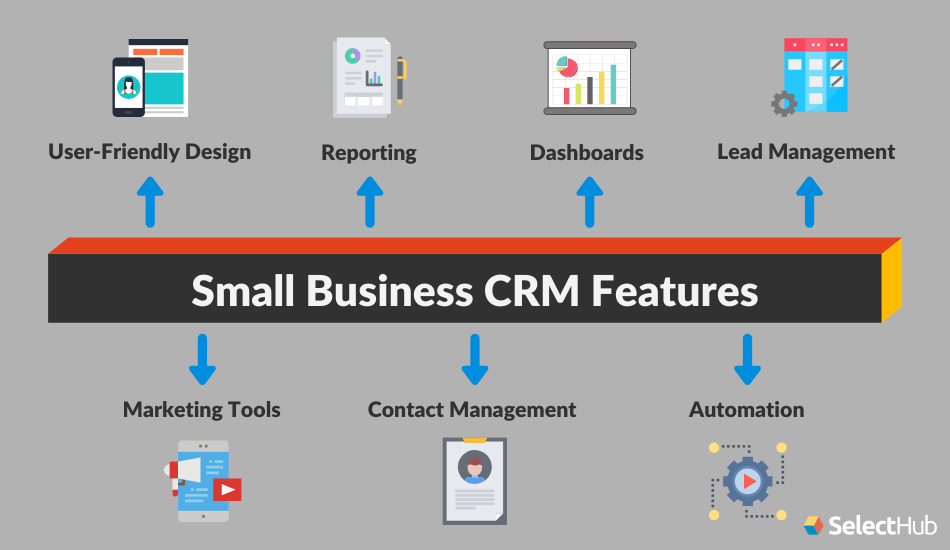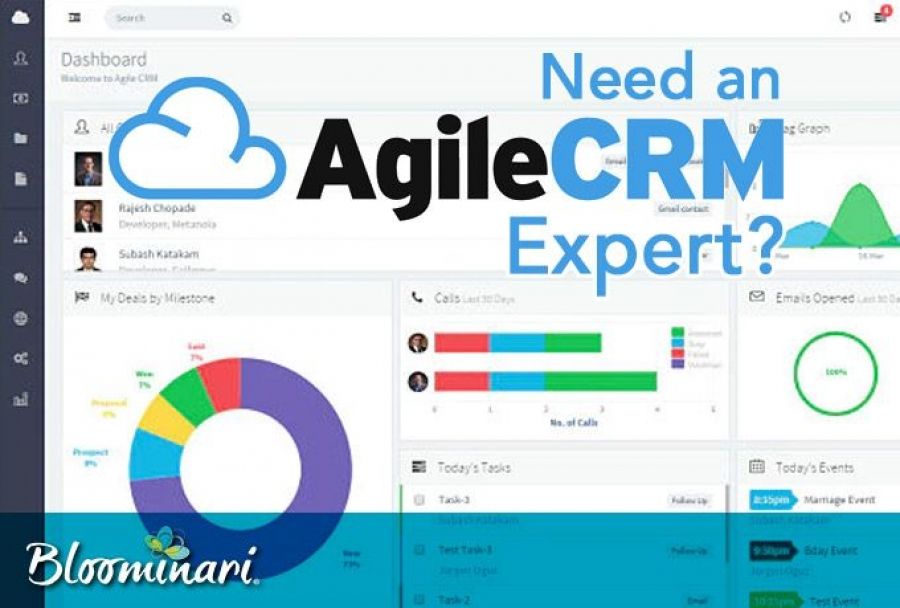Best crm and marketing automation for small business – In the realm of small businesses, the marriage of CRM and marketing automation emerges as a transformative force, empowering entrepreneurs with the tools to streamline operations, forge lasting customer relationships, and propel their marketing efforts to new heights.
Our comprehensive guide delves into the intricacies of this dynamic duo, providing a roadmap for small businesses seeking to harness the full potential of these technologies.
Best CRM and Marketing Automation Software for Small Businesses

Effective customer relationship management (CRM) and marketing automation are crucial for small businesses to streamline operations, enhance customer engagement, and drive growth. Here’s a comprehensive list of the top CRM and marketing automation software solutions tailored specifically for small businesses, along with their key features, pricing, and user reviews:
Top CRM and Marketing Automation Software for Small Businesses, Best crm and marketing automation for small business
- HubSpot CRM: A free and easy-to-use CRM that offers basic CRM features, email marketing, and marketing automation.
- Salesforce Essentials: A CRM designed for small businesses, offering lead management, opportunity tracking, and customer support.
- Zoho CRM: A comprehensive CRM with advanced features like sales forecasting, workflow automation, and reporting.
- Freshsales: A cloud-based CRM that provides lead management, sales automation, and built-in phone support.
- Pipedrive: A visual sales pipeline management tool that helps businesses track and manage their sales process.
When choosing the best CRM and marketing automation software for your small business, consider factors such as your industry, business size, and budget.
Read user reviews, explore free trials, and consult with experts to make an informed decision.
Benefits of Using CRM and Marketing Automation
Integrating CRM and marketing automation offers numerous advantages for small businesses, enabling them to streamline operations, foster stronger customer relationships, and elevate their marketing strategies.
Streamlined Operations
- Centralized customer data management eliminates the need for manual data entry, reducing errors and saving time.
- Automated workflows streamline repetitive tasks, such as lead nurturing and appointment scheduling, freeing up staff for more strategic initiatives.
- Improved data visibility allows teams to make informed decisions based on real-time insights.
Enhanced Customer Relationships
- Personalized communication tailored to individual customer preferences strengthens relationships and fosters loyalty.
- Automated follow-ups and reminders ensure prompt and consistent customer service, enhancing satisfaction.
li>Tracking customer interactions provides valuable insights into their needs and preferences, enabling businesses to offer more relevant products and services.
Elevated Marketing Efforts
- Targeted campaigns based on customer segmentation improve marketing ROI by reaching the right prospects with the right message.
- Automated email marketing and social media campaigns save time and increase engagement.
- Tracking and analyzing marketing performance metrics provides data-driven insights for continuous improvement.
Factors to Consider When Choosing a CRM and Marketing Automation Solution: Best Crm And Marketing Automation For Small Business
When selecting a CRM and marketing automation solution, small businesses should carefully consider the following factors to ensure the chosen solution aligns with their specific needs and goals:
Features
- Identify the core functionalities required for your business, such as contact management, lead generation, sales tracking, and marketing campaign execution.
- Evaluate the availability of additional features that may enhance your operations, such as customer segmentation, automated workflows, and reporting capabilities.
Cost
- Determine the budget allocated for CRM and marketing automation software.
- Consider the pricing models offered by different vendors, including subscription fees, per-user fees, and implementation costs.
- Assess the return on investment (ROI) potential of the solution based on its features and capabilities.
Scalability
- Project the future growth of your business and ensure the CRM and marketing automation solution can scale accordingly.
- Consider the capacity of the solution to handle increased data volumes, user additions, and new functionalities as your business expands.
Integration Capabilities
- Identify other software applications used by your business, such as accounting, project management, and e-commerce platforms.
- Evaluate the integration capabilities of the CRM and marketing automation solution to ensure seamless data flow between these systems.
- Consider the availability of pre-built integrations or the ability to create custom integrations to meet your specific requirements.
Implementation and Best Practices
Implementing and utilizing CRM and marketing automation effectively requires careful planning and best practices. This involves data management strategies, campaign execution, and performance tracking to maximize the benefits of these tools.
Effective data management is crucial. Establish a centralized database to store and organize customer information, including demographics, preferences, and purchase history. Regular data cleansing and enrichment ensure data accuracy and quality.
Campaign Execution
Plan and execute marketing campaigns seamlessly with CRM and marketing automation. Define target audiences, segment customers based on specific criteria, and tailor personalized messages. Utilize automated workflows to streamline processes like email marketing, lead nurturing, and social media campaigns.
Performance Tracking
Track and analyze campaign performance to identify areas for improvement. Use metrics such as open rates, click-through rates, and conversion rates to gauge the effectiveness of your efforts. Regular reporting and analysis help optimize campaigns and enhance overall marketing ROI.
Case Studies and Success Stories
Numerous small businesses have experienced remarkable success by implementing CRM and marketing automation solutions. These case studies provide valuable insights into the challenges they overcame, the strategies they adopted, and the positive outcomes they achieved.
One notable example is a small retail store that faced challenges in managing customer relationships and tracking sales effectively. By implementing a CRM solution, they gained a centralized platform to store and organize customer data, including purchase history, preferences, and communication records.
This enabled them to provide personalized customer experiences, offer targeted promotions, and improve overall customer satisfaction.
Increased Sales and Revenue
By automating marketing campaigns and tracking customer behavior, they were able to identify opportunities for cross-selling and upselling, leading to increased sales and revenue.
Improved Customer Engagement
The CRM system also allowed them to track customer interactions across multiple channels, providing a comprehensive view of each customer’s journey. This enabled them to deliver timely and relevant communications, resulting in improved customer engagement and loyalty.
Enhanced Efficiency and Productivity
The marketing automation solution automated repetitive tasks such as email marketing, social media posting, and lead generation. This freed up valuable time for the small business team, allowing them to focus on more strategic initiatives.
Additional Resources and Tools
In addition to the aforementioned solutions, here’s a curated list of resources and tools to support your CRM and marketing automation journey.
These resources offer valuable insights, practical guidance, and opportunities for collaboration within the industry.
Industry Reports and Research
- CRM and Marketing Automation Trends Report by Salesforce:A comprehensive report providing insights into industry trends, best practices, and future projections.
- Marketing Automation Maturity Benchmark Report by HubSpot:An in-depth analysis of marketing automation adoption, effectiveness, and key performance indicators.
Webinars and Online Events
- CRM and Marketing Automation for Small Businesses Webinar by Keap:A live session covering the fundamentals of CRM and marketing automation for small businesses.
- Marketing Automation Strategies for Growth Virtual Summit by Marketo:A virtual event featuring industry experts sharing their insights on leveraging marketing automation for business growth.
Online Communities and Forums
- Salesforce Trailblazer Community:A global online community for Salesforce users, offering support, resources, and networking opportunities.
- HubSpot User Groups:Local and online groups where HubSpot users can connect, share knowledge, and troubleshoot challenges.
Final Thoughts

As we conclude our exploration, it becomes evident that CRM and marketing automation are indispensable allies for small businesses aspiring to thrive in today’s competitive landscape. By embracing these tools and implementing them strategically, entrepreneurs can unlock a world of possibilities, driving growth, enhancing customer satisfaction, and solidifying their position as industry leaders.
